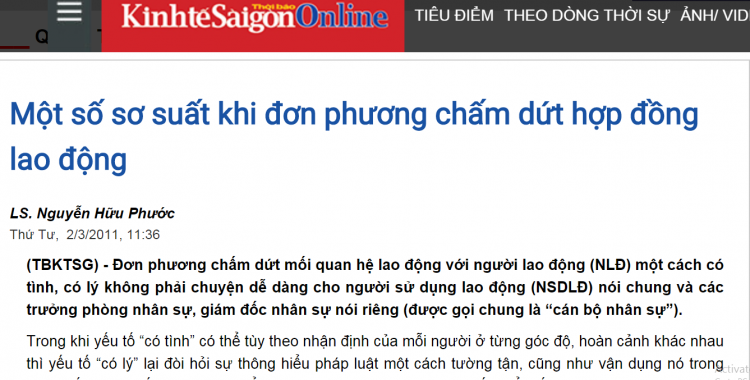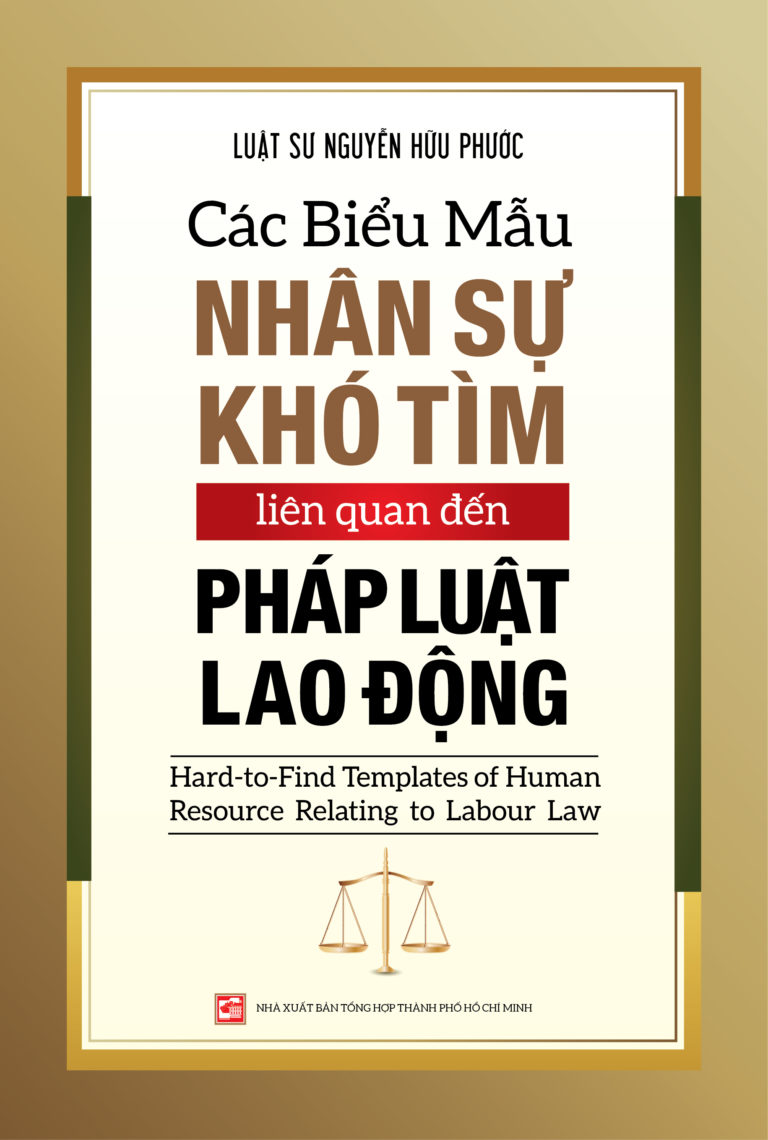Some carelessness in unilateral termination of labour contract
The article titled: “Some carelessness in unilateral termination of labour contract” from Lawyer Nguyen Huu Phuoc, is published on Sai Gon economic times, dated 24 February 2011.
***
The unilateral termination of the labour relationship with the employee conformable to reason and sentiment is not easy at all for the employer in general and the personnel managers and personnel directors in particular (jointly called “personnel officers”). While the factor of “conformable to sentiment” may change subject to the consideration of each person in different points of view and situations, the factor of “conformable to reason” requires the thorough understanding of laws, and the accurate application of that understanding in reality is actually an “art” that cannot be performed by everybody. The following are some common cases of carelessness that personnel officers often contract while executing the unilateral termination of labour contract with the employee.
Legal reason to terminate a labour contract
Among the typical cases that the employer may use as legal reason to unilaterally terminate a labour contract, there are some cases actually difficult to demonstrate. They are ones that the employers are easy to contract carelessness.
For the case – the change of structure or technology. The most common carelessness of the personnel officers is that they often do not perform the obligated procedure of re-training the employee into the new job prior to the procedure of laying the employee off. Besides, the next carelessness is that not every change of structure or technology may be applied because it will only be applied to partly or wholly change into advanced machine, equipment or process with higher labour capacity, or to the change of product or composition of product leading to using less labour, or to the change of framework of organization (if there is the mergence or dissolution of some departments of the enterprise).
However, it is not easy to prove clearly that the machine, equipment or process is of higher labour capacity or the change of product will lead to the use of less labour. Besides, the change of only one staff in a department of the enterprise will not be deemed as the change of structure, except that there is only one staff in that department.
For the case – the enterprise is merged, unified, divided, separated, transferred of ownership, management right or right of asset use of the enterprise, the terms “divided, separated, merged, unified” must be understood in compliance with the definition prescribed in the Law on Enterprise of Vietnam on “divided, separated, merged, unified”. The main carelessness of personnel officers is that they thought that the re-arrangement of management right over subsidiary companies in Vietnam among the companies in the same group or the mergence or unification of departments or divisions in the same company may be applied in this case, so that they wrongly apply this case to unilaterally terminate the labour contract.
For the case – the employee does frequently not complete the work under the labour contract. The common carelessness is that the employer bases on the fact that the performance of the assigned work of the employee does not meet the employer’s expectation and he lays the employee off without remembrance that the labour laws requires further that (i) the extent of the in-completion of the work shall be clearly stated in the labour contract, collective labour agreement or labour regulations of the enterprise; (ii) the in-completion of the work shall be originated from a subjective cause; (iii) the employee shall be minuted or reminded in writing at least two times in a month without making good his mistake. If the above three requirements are not met, the application of this case to unilaterally terminate the labour contract will easily be illegal.
For the case – the employee is dismissed as a form of discipline. Common mistake of personnel officers is that they base only on the Labour Regulations which has been registered at local Labour, War Invalids and Social Welfare Department to dismiss the employee. In case the labour contract does not state clearly the value of property has been stolen, embezzled or lost due to the disclosure of technology or business secret or the damages to property or interest of the enterprise caused by other actions, there is not the basis for application of this item to unilaterally terminate the labour contract.
For example, if the labour regulations state that the employee who smokes in the factory will be dismissed, in case an employee smokes he will be dismissed right away without the consideration of whether or not that action causes physical damages. Regarding this issue, labour laws prescribe that in case the employee commits theft, embezzlement, disclosure of technology or business secret, or other actions causing serious damages to property or interest of the enterprise, the employer will base on his business features to prescribe specifically the value of property has been stolen, embezzled or lost due to the disclosure of technology or business secret or the damages to property or interest of the enterprise caused by other actions to decide the dismissal of the employee. Meanwhile, the action of smoking inside the enterprise premise of the employee (if has not caused fire or explosion) does not cause damage to property or interest of the enterprise so there is not sufficient basis to apply this item to unilaterally terminate the labour contract.
For the case – natural calamity, fire or other force majeures in accordance with regulations of the Government that the employer has found all ways to overcome but is forced to restrict the production and reduce the jobs. Main carelessness in this case is that the other force majeures means the requirements of the relevant authorities at province level or higher or enemy-inflicted destruction or epidemic diseases that cannot be overcome leading to the restriction of production and reduction of jobs. Other force majeures deduced by the employer, such as the fact that the mother company loses its customers so it cannot order goods from the subsidiary company in Vietnam, and the fact that the subsidiary company faces force majeure and cannot arrange the jobs shall not be deemed as other force majeures allowing the employer to unilaterally terminate the labour contract.
Observing sufficiently the procedure
The carelessness of not inviting the Executive Committee of the Trade Union to participate or give opinion in any step of the procedure so required by the laws will make the preparation of the employer useless.
For enterprises where the local union has not been established, the unilateral termination of labour contract is more unfeasible. In reality, the consultation with the local Labour, War Invalids and Social Welfare Department or management board of the industrial park regarding the unilateral termination of labour contract instead of the consultation with the Executive Committee of the Trade Union in the above mentioned cases is only a provisional measure and without solid legal basis to be deemed as lawful. In some places, the local Labour, War Invalids and Social Welfare Departments or management boards of the industrial parks gives the reply, and in some other places they do not, since these authorities consider that they have not competence to reply such a question.
Procedure observation is one among the important parts in the legal unilateral termination of labour contract. Let’s take the case of the procedure of employee dismissal as a typical example for the fact that the employer shall observe seriously these procedures, otherwise he will lose his case when dispute arises and settled by the court.
The first common carelessness is that the personnel officers often forget that the prescription for dealing with breaching of labour discipline is only 3 months from the date of occurrence or discovery of the breach, and 6 months for the breaches relating finance, property and disclosure of technology or business secret of the enterprise. This leads to the situation that the dismissal is applied when the prescription expires, and the possibility for the employer to lose his case is very strong.
The second common carelessness is that the personnel officer advises the employer to dismiss the employee during the time he/she in sick leave, in convalescence or off work with approval of the employer, or waiting for the investigation of the relevant authority regarding the breach, or the female employee is pregnant, in maternity leave, breeding an under-twelve-month old child, or male employee breeding an under-twelve-month old child.
The third common carelessness is that the personnel officer signs the dismissal decision without the legal letter of attorney from the legal representative of the enterprise. The fourth common carelessness is that the discipline does not allow the employee to appoint the defending attorneys, or without opinion of the Executive Committee of the Trade Union in the minutes of discipline. The fifth common carelessness is that the organization of the discipline meeting when the employee has just been absent one or two times, while the laws require that the employee may be disciplined without his presence only after three times of absence in the discipline meeting.
The practice that is conformable to sentiment is one thing, and the practice conformable to reason is also very important, and if it is not performed careful, it will likely cause useless dispute and both parties will lose time, money and effort to pursue the lawsuit at the court. The prior consultancy of lawyers specializing in labour is necessary for the employer to understand clearly about the order and procedure in order to unilaterally terminate the labour contract legally, and it is the job that owners of enterprises should do. If we think that it is impossible to unilaterally terminate the labour contract, we may consider the negotiation with the employee to terminate the labour contract ahead of schedule.










